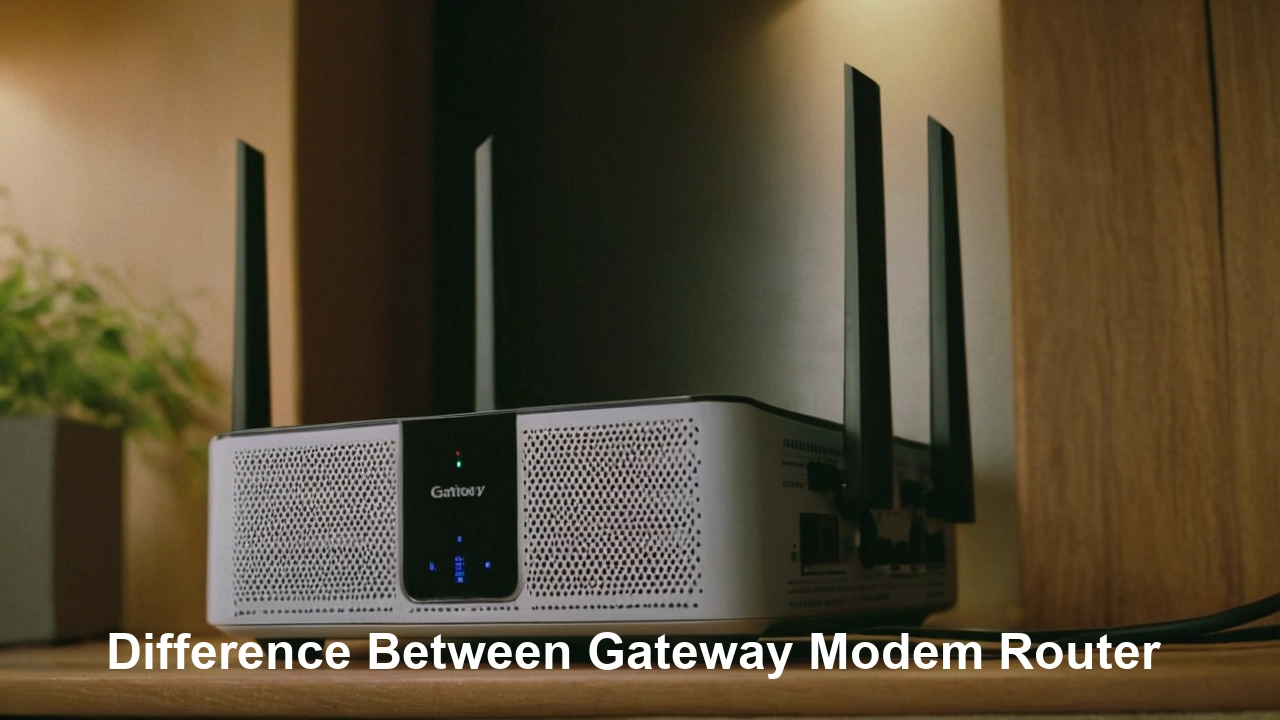-
Posted on: 25 Nov 2024

-
Of course, in the universe of home and business networking, having a powerful Internet connection is indispensable. Availability of a functional network also determines the difference between continuous browsing and a slow running visit in the internet. To get the best out of your network it is important to know the several parts that are used in networking for instance modems and routers. But there is confusion to differentiating between a gateway modem router and the two items independently. Therefore, let me give you a brief idea regarding Network devices and let’s step down into its two important categories.
1. What is a gateway modem router?:
A gateway modem router also known as or just referred to as gateway is an all in one device that both functions as a modem and a router. This consolidated design also minimizes the complexity of networking since few devices are used to create an internet connection. The gateway modems are typically branded for certain ISPs as this simplifies the configuration and may help eliminate compatibility problems.
2. Parts of a Gateway Modem Router
A gateway modem router consists of two main parts:
- Modem: This component takes the signal from your ISP and translates it into a format that is comprehensible by the devices that are integrated in your home. Modems on the other hand use phone or cable lines to link to the internet and facilitate transfer of data between the network and your devices.
- Router: This part takes signals from the modem and transmits them to the devices that are connected on the network so that they can be able to communicate with other’s and share on resources such as files and printer. Routers establish an area network in your home or office and assist in controlling the flow of traffic and security of the network.
3. Benefits of Gateway modem router
- Simplified Setup: The modem-router is preferred to a separate device for the modem and router because it simplifies the configuration of a home or office network. No more mess with different cables and connections and the settings them up.
- Cost-Effective: They are cheaper to use than other modems because they do not require the user to own different equipment. This consolidation can be a notable one and this is very true for a lot of consumer, particularly those who are smart about their spending.
- Compatibility: These devices are generally tailored to run with particular ISPs in order to minimize compatibility problems and prolong a better connection.
4. Cons of Gateway Modems
- Limited Customization: Due to the fact that a gateway modem router integrates two object combining two aspects into a single specification, you may experience you do not have the liberty of tweaking various aspects due to a fixed security protocol or firewall.
- Reduced Upgrade Potential: Sometimes it is not just the modem or the router that needs upgrading, but the whole gateway if only one requires an upgrade. This can be a nightmare, especially as the trends in technologies change every other time.
- ISP Dependency: Gateway modems are made to handle a singular ISP, and switching over to a new ISP can bring complications since you won’t have new hardware.
1. What is a Modem?
A modem, short for modulator-demodulator, is an equipment that links your home or office local area network to the internet. It takes digital signals from your ISP and translates them to analog form that can be transmitted over your phone or cable lines. When it gets to the destination, the modem Carrier wave demodulates the AM signal back into the digital format that you, and your devices, can understand.
2. Components of a Modem
A modem has two main components:
- Ethernet Port: This is employed to enable connection of the modem to your router and thus offer you a more direct and wired network connection to your devices.
- WAN Port: This port allows the modem to connect to your ISP’s network, by the use of either a phone line or a cable.
3. Advantages of a Modem
- Flexibility: Gateway modem routers are not as flexible as standalone modems because if the modem is faulty or outdated it affects the whole network.
- Compatibility: Thanks to the modem, one can change ISPs without having to buy new apparatus.
- Customization: incorporations of modular parts of telecoms mean that one can select individual parts from preferred modem vendors to suit own specific requirements.
4. Disadvantages of a Modem
- More Expensive: Although, acquiring a gateway modem router may prove expensive, it is cheaper than acquiring another modem and router.
- Additional Equipment: Having two devices means taking up more space, possibly more wires, and possibly more bulk and More complexity in order to set them both up.
1. What is a Router?
A router is a networking device that connects two or more computer networks and allows the communication to happen between these two and other networks. Routers form a network which connects various appliances to make sure they will interconnect and share data. Routers used in the home or office environment will allow a single internet connection to be distributed throughout a building.
2. Components of a Router
A router has several key components:
- Ethernet Ports: These are employed for computers and game consoles and any other device you want to connect to your network. You may also use these ports to connect your router to the modem.
- Wi-Fi Antenna: Instead of cabling, routers transmit a Wi-Fi signal to which the devices can connect, doing away with the cables.
- Processor: This component controls the traffic flow of network devices which facilitates communication between your various network devices.
3. Advantages of a Router
- Wi-Fi Connectivity: It also has outlets for wire-less connections, through these you can connect to your network without the use of cables like the Ethernet.
- Enhanced Customization: Compared to gateway modem routers, individual routers provide more configurations because you can manage it directly and have full configurational rights to all aspects such as security, traffic and other features.
- Upgrade Potential: Modularity is provided by having different routers where the whole setup can be upgraded or changed individually as the need arises.
4. Disadvantages of a Router
- Additional Equipment: Just like having stand-alone modem, having a separate routers involve the use and installation of another device.
- Complexity: The few users who may not like being required to configure separate devices separately from a single gateway modem router may not need it.
Conclusion
If you plan on establishing a network connection in your home or office, it is important to realise the difference between gateway modem routers, modems, and routers. Gateway modem routers are effective in that they are an all in one package however standalone devices tend to have more control, compatibility, and versatility. In light with these facts, this paper recommends that by doing a comparison of your requirements and predilections, you get to enjoy the most favorable networking solution to your internet necessity. Therefore choose wisely and allow yourself to have the advantages of a fast, reliable and efficient network connection.





